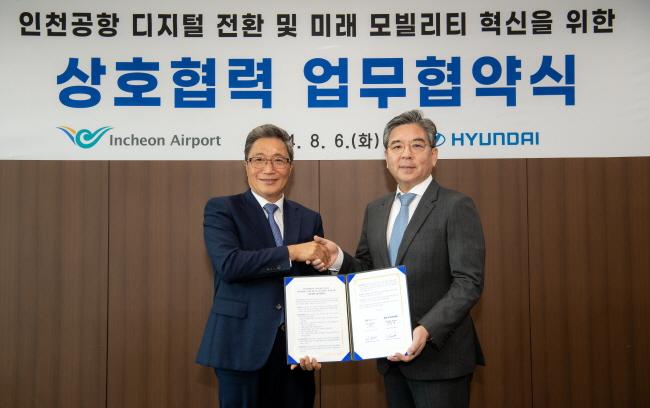
Hydrogen, eco-friendly mobility, robotics, AAM (Advanced Air Mobility: future air mobility), autonomous driving, and other future mobility technologies from Hyundai Motor will be implemented at global mega-hub airports that see over 100 million passengers annually.
Hyundai Motor and Incheon International Airport Corporation announced on the 6th at the Incheon International Airport Corporation headquarters, attended by CEO Jang Jae-hoon of Hyundai and CEO Lee Hak-jae of Incheon International Airport Corporation, the signing of a ‘Memorandum of Understanding for Mutual Cooperation for Digital Transformation and Future Mobility Innovation at Incheon International Airport.’
This cooperation will drive initiatives in various fields including: ▲ the transition to eco-friendly mobility for commercial and special vehicles at the airport and the expansion of hydrogen infrastructure, ▲ the introduction of automation in airport logistics and robotics for intelligent logistics facilities, ▲ the establishment of an AAM ecosystem, ▲ timely implementation of autonomous mobility services, ▲ the exhibition and promotion of future technologies, and ▲ support for other corporate businesses across the realm of smart mobility.
At the signing ceremony, Hyundai’s CEO Jang Jae-hoon stated, “Hyundai plans to implement a variety of future mobility technologies such as hydrogen, autonomous driving, robotics, and AAM to ensure that all passengers visiting Incheon International Airport can experience innovative mobility throughout the airport. Through this MOU, we will enhance the mobility experience for passengers and ultimately strive to make Incheon International Airport a hub where various smart mobility solutions flow.”
Incheon International Airport Corporation’s CEO Lee Hak-jae remarked, “Through this agreement, we plan to expedite the digital transformation of Incheon Airport by integrating Hyundai Motor’s outstanding technologies, making it a leading airport that continues to drive future change and becomes a desired destination.”
Utilizing its advantage as a gateway airport in South Korea, a country strong in IT technologies, Incheon International Airport aims to continuously advance its ongoing ‘digital transformation’ into the field of future mobility, developing into a ‘global technology convergence transport platform’ where passengers and airport personnel can enjoy advanced mobility technologies throughout the airport.
Hyundai is also set to take a leading role in implementing core future mobility technologies at a global mega-hub airport serving over 100 million passengers annually, not only showcasing technology innovation to global customers but also utilizing it as a global testbed to gauge customer response.
The completion of the fourth phase of construction at Incheon International Airport by the end of this year will increase its passenger capacity from the current 77 million to 106 million and raise its cargo handling capacity from 5 million tons to 6.3 million tons, positioning it as the world’s third-largest global mega-hub airport based on international passenger numbers.
At this transformative moment, the expected synergy effect from Hyundai and Incheon International Airport’s smart future mobility introduction and ecosystem construction is considerable.
Hyundai Motor and Incheon International Airport Corporation are already engaged in various cooperative projects in areas such as AAM, robotics, and autonomous driving. With this agreement, both companies plan to establish a more cohesive collaborative framework to integrate existing partnerships and pursue comprehensive mutual cooperation across all sectors.
In particular, the scope of existing partnerships is expected to expand, accelerating the development of new collaborative projects.
In terms of hydrogen projects, Hyundai has already supplied a total of 12 hydrogen-electric buses for airport shuttle services to Incheon International Airport Corporation from 2021 to 2023, and plans to supply an additional 10 by the end of this year.
Additionally, there are currently two hydrogen charging stations operating near Incheon International Airport’s Terminals 1 and 2.
Hyundai aims to further strengthen its collaboration by expanding hydrogen charging stations in the airport vicinity and converting around 160 airport limousines, shuttle buses, and airport logistics forklifts and trucks into hydrogen fuel cell systems.
Major global airports are also actively introducing airport ground service vehicles, buses based on hydrogen fuel cell systems, and hydrogen charging stations to achieve decarbonization.
There are also expectations for new collaborative projects in the robotics field.
Hyundai and Incheon International Airport Corporation are exploring ways to deploy and utilize intelligent robots being developed by companies like Boston Dynamics in various sectors including ▲ airport security, ▲ logistics, and ▲ passenger services.
Moreover, in the AAM sector, Hyundai and Incheon International Airport Corporation formed the ‘K-UAM One Team’ consortium in 2021, along with Korean Air, KT, and Hyundai Engineering & Construction, to commercialize domestic UAM (Urban Air Mobility).
The ‘K-UAM One Team’ successfully completed Phase 1 of the pilot project for Korean urban air mobility at Goheung, Jeollanam-do, conducted by the Ministry of Land, Infrastructure, and Transport last April. This memorandum of understanding is anticipated to further strengthen the partnership between the two companies.
In the area of autonomous driving technology, based on experiences from pilot services using autonomous driving robo-shuttles in Sejong Smart City, Pangyo Zero City in Gyeonggi Province, and the National Assembly, preparations are also underway for a pilot service at Incheon International Airport, along with the development of personal mobility solutions for the convenience of differently-abled travelers within the airport terminal.
Additionally, the two companies have agreed to work together to ensure that Incheon International Airport becomes an ‘exciting airport’ for travelers by providing differentiated attractions related to future mobility and advanced technologies, enhancing the customer experience.
Currently, the Genesis brand operates an experiential vehicle exhibition zone in area G of the departure hall on the third floor of Incheon International Airport’s Terminal 1.
Furthermore, Incheon International Airport Corporation is set to devise various support measures related to airport usage for smoothly advancing major cooperative projects and Hyundai’s business in the future.
A Hyundai representative stated, “This mutual cooperation covering various aspects of future mobility will be a significant turning point in providing seamless mobility freedom for airport passengers.”
By Jang Jin-seok daedusj@autodiry.kr
